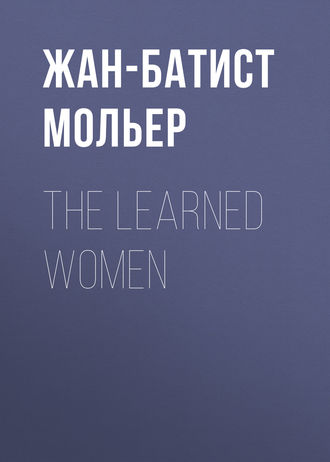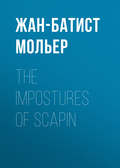
Мольер (Жан-Батист Поклен)
The Learned Women
BEL. (to HENRIETTE). What! my niece, you listen to what has been read without emotion! You play there but a sorry part!
HEN. We each of us play the best part we can, my aunt, and to be a wit does not depend on our will.
TRI. My verses, perhaps, are tedious to you.
HEN. No. I do not listen.
PHI. Ah! let us hear the epigram.
TRI. ON A CARRIAGE OF THE COLOUR OF AMARANTH GIVEN TO ONE OF HIS LADY FRIENDS.2
PHI. His titles have always something rare in them.
ARM. They prepare one for a hundred flashes of wit.
TRI.
Love for his bonds so dear a price demands,
E'en now it costs me more than half my lands,
And when this chariot meets your eyes,
Where so much gold emboss'd doth rise
That people all astonished stand,
And Laïs rides in triumph through the land…
PHI. Ah! Laïs! what erudition!
BEL. The cover is pretty, and worth a million.
TRI.
And when this chariot meets your eyes, Where so much gold emboss'd doth rise That people all astonished stand, And Laïs rides in triumph through the land, Say no more it is amaranth, Say rather it is o' my rent.
ARM. Oh, oh, oh! this is beyond everything; who would have expected that?
PHI. He is the only one to write in such taste.
BEL. Say no more it is amaranth, say rather it is o' my rent! It can be declined; my rent; of my rent; to my rent; from my rent.
PHI. I do not know whether I was prepossessed from the first moment I saw you, but I admire all your prose and verse whenever I see it.
TRI. (to PHILAMINTE). If you would only show us something of your composition, we could admire in our turn.
PHI. I have done nothing in verse; but I have reason to hope that I shall, shortly, be able, as a friend, to show you eight chapters of the plan of our Academy. Plato only touched on the subject when he wrote the treatise of his Republic; but I will complete the idea as I have arranged it on paper in prose. For, in short, I am truly angry at the wrong which is done us in regard to intelligence; and I will avenge the whole sex for the unworthy place which men assign us by confining our talents to trifles, and by shutting the door of sublime knowledge against us.
ARM. It is insulting our sex too grossly to limit our intelligence to the power of judging of a skirt, of the make of a garment, of the beauties of lace, or of a new brocade.
BEL. We must rise above this shameful condition, and bravely proclaim our emancipation.
TRI. Every one knows my respect for the fairer sex, and that if I render homage to the brightness of their eyes, I also honour the splendour of their intellect. PHI. And our sex does you justice in this respect: but we will show to certain minds who treat us with proud contempt that women also have knowledge; that, like men, they can hold learned meetings – regulated, too, by better rules; that they wish to unite what elsewhere is kept apart, join noble language to deep learning, reveal nature's laws by a thousand experiments; and on all questions proposed, admit every party, and ally themselves to none.
TRI. For order, I prefer peripateticism.
PHI. For abstractions I love Platonism.
ARM. Epicurus pleases me, for his tenets are solid.
BEL. I agree with the doctrine of atoms: but I find it difficult to understand a vacuum, and I much prefer subtile matter.
TRI. I quite agree with Descartes about magnetism.
ARM. I like his vortices.
PHI. And I his falling worlds. [Footnote: Notes do not seem necessary here; a good English dictionary will give better explanations than could be given except by very long notes.]
ARM. I long to see our assembly opened, and to distinguish ourselves by some great discovery.
TRI. Much is expected from your enlightened knowledge, for nature has hidden few things from you.
PHI. For my part, I have, without boasting, already made one discovery; I have plainly seen men in the moon.
BEL. I have not, I believe, as yet quite distinguished men, but I have seen steeples as plainly as I see you. [Footnote: An astronomer of the day had boasted of having done this.]
ARM. In addition to natural philosophy, we will dive into grammar, history, verse, ethics, and politics.
PHI. I find in ethics charms which delight my heart; it was formerly the admiration of great geniuses; but I give the preference to the Stoics, and I think nothing so grand as their founder.
ARM. Our regulations in respect to language will soon be known, and we mean to create a revolution. Through a just or natural antipathy, we have each of us taken a mortal hatred to certain words, both verbs and nouns, and these we mutually abandon to each other. We are preparing sentences of death against them, we shall open our learned meetings by the proscription of the diverse words of which we mean to purge both prose and verse.
PHI. But the greatest project of our assembly – a noble enterprise which transports me with joy, a glorious design which will be approved by all the lofty geniuses of posterity – is the cutting out of all those filthy syllables which, in the finest words, are a source of scandal: those eternal jests of the fools of all times; those nauseous commonplaces of wretched buffoons; those sources of infamous ambiguity, with which the purity of women is insulted.
TRI. These are indeed admirable projects.
BEL. You shall see our regulations when they are quite ready.
TRI. They cannot fail to be wise and beautiful.
ARM. We shall by our laws be the judges of all works; by our laws, prose and verse will both alike be submitted to us. No one will have wit except us or our friends. We shall try to find fault with everything, and esteem no one capable of writing but ourselves.
SCENE III – PHILAMINTE, BÉLISE, ARMANDE, HENRIETTE, TRISSOTIN, LÉPINE
LEP. (to TRISSOTIN). Sir, there is a gentleman who wants to speak to you; he is dressed all in black, and speaks in a soft tone. (They all rise.)
TRI. It is that learned friend who entreated me so much to procure him the honour of your acquaintance.
PHI. You have our full leave to present him to us. (TRISSOTIN goes out to meet VADIUS.)
SCENE IV. – PHILAMINTE, BÉLISE, ARMANDE, HENRIETTE
PHI. (to ARMANDE and BÉLISE). At least, let us do him all the honours of our knowledge. (To HENRIETTE, who is going) Stop! I told you very plainly that I wanted to speak to you.
HEN. But what about?
PHI. You will soon be enlightened on the subject.
SCENE V. – TRISSOTIN, VADIUS, PHILAMINTE, BÉLISE, ARMANDE, HENRIETTE
TRI. (introducing VADIUS). [Footnote: It is probably Ménage who is here laughed at.] Here is the gentleman who is dying to see you. In presenting him I am not afraid, Madam, of being accused of introducing a profane person to you; he can hold his place among the wits.
PHI. The hand which introduces him sufficiently proves his value.
TRI. He has a perfect knowledge of the ancient authors, and knows
Greek, Madam, as well as any man in France.
PHI. (to BÉLISE). Greek! O heaven! Greek! He understands Greek, sister!
BEL. (to ARMANDE). Ah, niece! Greek!
ARM. Greek! ah! how delightful!
PHI. What, Sir, you understand Greek? Allow me, I beg, for the love of
Greek, to embrace you. (VADIUS embraces also BÉLISE and
ARMANDE.)
HEN. (to VADIUS, who comes forward to embrace her)
Excuse me, Sir, I do not understand Greek. (They sit down.)
PHI. I have a wonderful respect for Greek books.
VAD. I fear that the anxiety which calls me to render my homage to you to-day, Madam, may render me importunate. I may have disturbed some learned discourse.
PHI. Sir, with Greek in possession, you can spoil nothing.
TRI. Moreover, he does wonders in prose as well as in verse, and he could, if he chose, show you something.
VAD. The fault of authors is to burden conversation with their productions; to be at the Palais, in the walks, in the drawing-rooms, or at table, the indefatigable readers of their tedious verses. As for me, I think nothing more ridiculous than an author who goes about begging for praise, who, preying on the ears of the first comers, often makes them the martyrs of his night watches. I have never been guilty of such foolish conceit, and I am in that respect of the opinion of a Greek, who by an express law forbade all his wise men any unbecoming anxiety to read their works. – Here are some little verses for young lovers upon which I should like to have your opinion.
TRI. Your verses have beauties unequalled by any others.
VAD. Venus and the Graces reign in all yours.
TRI. You have an easy style, and a fine choice of words.
VAD. In all your writings one finds ithos and pathos.
TRI. We have seen some eclogues of your composition which surpass in sweetness those of Theocritus and Virgil.
VAD. Your odes have a noble, gallant, and tender manner, which leaves
Horace far behind.
TRI. Is there anything more lovely than your canzonets?
VAD. Is there anything equal to the sonnets you write?
TRI. Is there anything more charming than your little rondeaus?
VAD. Anything so full of wit as your madrigals?
TRI. You are particularly admirable in the ballad.
VAD. And in bouts-rimés I think you adorable.
TRI. If France could appreciate your value —
VAD. If the age could render justice to a lofty genius —
TRI. You would ride in the streets in a gilt coach.
VAD. We should see the public erect statues to you. Hem…(to
TRISSOTIN). It is a ballad; and I wish you frankly to…
TRI. (to VADIUS). Have you heard a certain little sonnet upon the Princess Urania's fever?
VAD. Yes; I heard it read yesterday.
TRI. Do you know the author of it?
VAD. No, I do not; but I know very well that, to tell him the truth, his sonnet is good for nothing.
TRI. Yet a great many people think it admirable.
VAD. It does not prevent it from being wretched; and if you had read it, you would think like me.
TRI. I know that I should differ from you altogether, and that few people are able to write such a sonnet.
VAD. Heaven forbid that I should ever write one so bad!
TRI. I maintain that a better one cannot be made, and my reason is that I am the author of it.
VAD. You?
TRI. Myself.
VAD. I cannot understand how the thing can have happened.
TRI. It is unfortunate that I had not the power of pleasing you.
VAD. My mind must have wandered during the reading, or else the reader spoilt the sonnet; but let us leave that subject, and come to my ballad.
TRI. The ballad is, to my mind, but an insipid thing; it is no longer the fashion, and savours of ancient times.
VAD. Yet a ballad has charms for many people.
TRI. It does not prevent me from thinking it unpleasant.
VAD. That does not make it worse.
TRI. It has wonderful attractions for pedants.
VAD. Yet we see that it does not please you.
TRI. You stupidly give your qualities to others.
(They all rise.)
VAD. You very impertinently cast yours upon me.
TRI. Go, you little dunce! you pitiful quill-driver!
VAD. Go, you penny-a-liner! you disgrace to the profession!
TRI. Go, you book-maker, you impudent plagiarist!
VAD. Go, you pedantic snob!
PHI. Ah! gentlemen, what are you about?
TRI. (to VADIUS). Go, go, and make restitution to the Greeks and Romans for all your shameful thefts.
VAD. Go and do penance on Parnassus for having murdered Horace in your verses.
TRI. Remember your book, and the little noise it made.
VAD. And you, remember your bookseller, reduced to the workhouse.
TRI. My glory is established; in vain would you endeavour to shake it.
VAD. Yes, yes; I send you to the author of the 'Satires.' [Footnote:
Boileau.]
TRI. I, too, send you to him.
VAD. I have the satisfaction of having been honourably treated by him; he gives me a passing thrust, and includes me among several authors well known at the Palais; but he never leaves you in peace, and in all his verses you are exposed to his attacks.
TRI: By that we see the honourable rank I hold. He leaves you in the crowd, and esteems one blow enough to crush you. He has never done you the honour of repeating his attacks, whereas he assails me separately, as a noble adversary against whom all his efforts are necessary; and his blows, repeated against me on all occasions, show that he never thinks himself victorious.
VAD. My pen will teach you what sort of man I am.
TRI. And mine will make you know your master.
VAD. I defy you in verse, prose, Greek and Latin.
TRI. Very well, we shall meet each other alone at Barbin's. [Footnote: Barbin, a famous bookseller. The arms chosen for the duel would no doubt be books. See "The Lutrin," by Boileau.]






